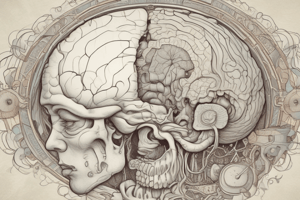Podcast
Questions and Answers
What is the main characteristic of hydrocephalus?
What is the main characteristic of hydrocephalus?
- Abnormal enlargement of the spinal cord
- Accumulation of blood in the ventricles of the brain
- Accumulation of cerebrospinal fluid within the ventricles of the brain (correct)
- Blockage of air flow in the brain
Which type of hydrocephalus occurs due to injury or disease damaging the brain's ability to manage CSF?
Which type of hydrocephalus occurs due to injury or disease damaging the brain's ability to manage CSF?
- Acquired hydrocephalus (correct)
- Congenital hydrocephalus
- Genetic hydrocephalus
- Traumatic hydrocephalus
What are some common symptoms of congenital hydrocephalus in infants?
What are some common symptoms of congenital hydrocephalus in infants?
- Increased appetite and hyperactivity
- Developmental delays, seizures, and head enlargement (correct)
- Visible skin changes
- Rapid weight gain
How is congenital hydrocephalus usually treated?
How is congenital hydrocephalus usually treated?
What can cause acquired hydrocephalus?
What can cause acquired hydrocephalus?
In acquired hydrocephalus, what aspect of the brain's function is affected by injury or disease?
In acquired hydrocephalus, what aspect of the brain's function is affected by injury or disease?
How many layers of meninges are there in the brain?
How many layers of meninges are there in the brain?
What is a common symptom of meningitis?
What is a common symptom of meningitis?
Which type of meningitis is the most serious?
Which type of meningitis is the most serious?
What is the most important investigation for diagnosing meningitis?
What is the most important investigation for diagnosing meningitis?
Which scenario can lead to the development of meningitis post-surgery?
Which scenario can lead to the development of meningitis post-surgery?
What are some signs of meningitis that can help in diagnosis?
What are some signs of meningitis that can help in diagnosis?
Why is lumbar puncture contraindicated in the presence of a large space-occupying lesion?
Why is lumbar puncture contraindicated in the presence of a large space-occupying lesion?
What is the primary concern when considering performing a lumbar puncture with a small lesion present?
What is the primary concern when considering performing a lumbar puncture with a small lesion present?
Why is CSF analysis essential in managing meningitis?
Why is CSF analysis essential in managing meningitis?
What is the initial step in treating meningitis once the causative organism is identified?
What is the initial step in treating meningitis once the causative organism is identified?
Why should lumbar puncture be done cautiously even with a small lesion present?
Why should lumbar puncture be done cautiously even with a small lesion present?
Flashcards are hidden until you start studying
Study Notes
Hydrocephalus: An Overview of Cerebrospinal Fluid Dysfunction
Hydrocephalus is a medical condition characterized by an abnormal accumulation of cerebrospinal fluid (CSF) within the ventricles of the brain. This excess fluid puts pressure on the brain, causing it to expand, which can lead to various neurological symptoms and damage if left untreated. There are two main types of hydrocephalus: congenital and acquired.
Congenital Hydrocephalus
Congenital hydrocephalus occurs when the normal flow of CSF is obstructed before birth, leading to increased pressure and enlargement of the ventricles. It may result from a genetic mutation or other underlying conditions such as spina bifida, myelomeningocele, or arachnoid cysts. Symptoms of congenital hydrocephalus usually become apparent shortly after birth or during infancy, and may include enlargement of the head, irritability, feeding problems, developmental delays, and seizures. Treatment typically involves shunting procedures, where the fluid is redirected away from the affected area through tubing placed under the scalp.
Acquired Hydrocephalus
Acquired hydrocephalus results from injury or disease that damages the brain's ability to produce, absorb, or circulate CSF. Conditions that can cause this type of hydrocephalus include meningitis, traumatic brain injuries, brain tumors, and subarachnoid hemorrhage. Symptoms of acquired hydrocephalus vary depending on the severity of the underlying condition, but may include severe headache, vomiting, drowsiness, poor coordination, and deteriorating cognitive function. Treatment options are similar to those for congenital hydrocephalus, involving shunt placement or alternative methods like endoscopic third ventriculostomy.
Managing hydrocephalus requires careful attention to monitor the patient's response to treatment and address complications promptly. While shunting remains a common approach, newer treatments such as minimally invasive surgeries and noninvasive drug therapies are being explored to improve outcomes and reduce associated risks.
Studying That Suits You
Use AI to generate personalized quizzes and flashcards to suit your learning preferences.



